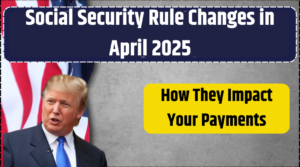The UK government has announced a one-time £250 Cost of Living Payment set to be distributed in April 2025. Designed to help vulnerable households struggling with rising costs, this initiative is funded through the Household Support Fund (HSF) and aims to provide relief to low-income families, pensioners, and disabled individuals facing financial hardship.
With ongoing inflation, soaring utility bills, and increasing food prices, many UK residents continue to find it difficult to cover basic living expenses. This financial aid serves as a critical lifeline, helping eligible recipients stay afloat during challenging times. If you’re wondering whether you qualify or how to claim the payment, this guide provides all the essential details.
Key Details of the £250 Cost of Living Payment
| Feature | Details |
|---|---|
| Payment Amount | £250 (one-off) |
| Payment Date | Starting April 2025 |
| Who Is Eligible | Low-income households, people on benefits, pensioners, disabled individuals |
| How to Apply | Automatic for most, manual application for others via local councils |
| Source of Funds | Household Support Fund (extended to March 2026) |
| Official Government Info | gov.uk – Household Support Fund |
This initiative is part of broader efforts to address the cost-of-living crisis and ensure financial stability for those who need it most.
What Is the £250 Cost of Living Payment?
The £250 Cost of Living Payment is a financial assistance scheme aimed at helping UK residents manage essential expenses such as energy bills, groceries, housing, and other necessities.
The Household Support Fund was originally launched in 2021 in response to post-pandemic economic challenges and the global energy crisis. Now extended until March 2026, it continues to play a crucial role in supporting struggling households.
Who Is Eligible?
The eligibility criteria are determined by the government and local councils. You may qualify if you fall into one of the following categories:
1. People Receiving Means-Tested Benefits
If you currently receive any of the following benefits, you are likely to qualify automatically:
- Universal Credit
- Income Support
- Pension Credit
- Income-based Jobseeker’s Allowance (JSA)
- Income-related Employment and Support Allowance (ESA)
- Child Tax Credit
- Working Tax Credit
2. Pensioners
Pensioners receiving Pension Credit will automatically qualify for the payment. If you are over the State Pension age but not yet on Pension Credit, it may be worth applying, as this could also unlock additional financial support.
3. Disabled Individuals
If you receive disability-related benefits such as:
- Personal Independence Payment (PIP)
- Attendance Allowance
- Disability Living Allowance (DLA)
you may be eligible, though some councils require additional proof of medical needs.
4. Low-Income Households
Even if you do not receive benefits, you might still qualify if your income is below a certain threshold. Councils will typically assess:
- Household savings (often must be below £2,000)
- Monthly expenses (rent, utilities, childcare)
- Number of dependents
How Will the Payment Be Distributed?
1. Automatic Transfers
Most people receiving qualifying benefits will get the payment directly into their bank accounts without needing to apply.
2. Manual Applications
If you are not on benefits but still experiencing financial hardship, you may need to apply manually through your local council. This process usually involves providing:
- Recent payslips or benefit letters
- Bank statements
- Proof of rent or utility bills
- Identification documents
To find out how to apply, use the official Find Your Local Council tool on gov.uk.
How to Apply?
If you need to apply manually, follow these steps:
- Check Your Financial Situation
- Determine if you receive any of the qualifying benefits or if your income is below the required threshold.
- Find Your Local Council
- Use gov.uk to locate your council’s official website.
- Search for Household Support Fund (HSF) Information
- Look for terms like “Cost of Living Help” or “Household Support Fund.”
- Gather Required Documents
- Prepare proof of income, identification, and recent utility bills.
- Submit Your Application
- Follow your council’s instructions for completing the online or paper application.
- Monitor Your Status
- Applications are processed within 2-6 weeks, depending on demand.
Other Available Support Options
Beyond the £250 Cost of Living Payment, there are additional programs offering financial aid:
- Winter Fuel Payment (£250 – £600 for pensioners to cover heating costs)
- Cold Weather Payment (£25 per 7-day period of freezing temperatures)
- Warm Home Discount Scheme (£140 off electricity bills for eligible households)
- Council Tax Support (reductions in council tax bills for low-income residents)
Visit the gov.uk Cost of Living Hub for more information on these programs.
FAQs :
Do I need to apply for the £250 payment?
If you receive qualifying benefits, the payment is automatic. Otherwise, check with your local council.
Will this payment affect my other benefits?
No, the payment is non-taxable, non-repayable, and will not impact your existing benefits.
Can multiple people in the same household receive the payment?
Typically, the payment is issued per eligible household, not per individual.
What happens if I miss the application deadline?
Deadlines vary by council, so check their website early and apply as soon as possible.
Can I challenge a rejected application?
Yes, you can appeal or request a reassessment. Providing additional supporting documents may help.
Where can I get help with my application?
Citizens Advice, local charities, and community groups offer free assistance.
Final Thoughts
The £250 Cost of Living Payment is a crucial measure to support financially vulnerable UK residents in 2025. Whether you qualify automatically or need to apply, understanding the eligibility and distribution process ensures you receive the help you need. If you’re struggling, explore additional government assistance programs that can provide further relief.
For more details, visit gov.uk or contact your local council.




